|
|
|
Sort Order |
|
|
|
Items / Page
|
|
|
|
|
|
|
| Srl | Item |
| 1 |
ID:
152711
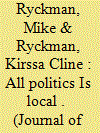

|
|
|
|
|
| Summary/Abstract |
Transnational terrorism is a complex, multinational phenomenon, and the transnational terrorism literature has increasingly turned to a dyadic research design in order to better capture these complexities. However, existing dyadic data tend to be proprietary or limited in scope, resulting in barriers for replication and generating new research. Toward that end, we develop a method to generate a dyadic transnational dataset using the publicly available Global Terrorism Database (GTD). The method is based on the premise that terror groups have a domestic agenda that is tied to a “home” state, which can be discerned based on the group’s patterns of attack. Dyads can then be constructed, where one side is the terror group’s home state and the other side is the target state, defined both by location of attack and the nationality of victims. To illustrate the utility of the data, the “logic of home” is applied to the question of transnational target selection. We replicate existing findings that examine the effect of troop deployments on the likelihood of transnational terrorist attacks, finding that troop deployments increase the likelihood of attacks against nationals of the deploying country. We further explore the effect of third-party support to the government side of a civil war, and find that intervention increases both the likelihood of attacks against nationals of the third-party intervener as well as attacks on the home soil of the intervening state.
|
|
|
|
|
|
|
|
|
|
|
|
|
|
|
|
| 2 |
ID:
137626
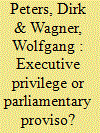

|
|
|
|
|
| Summary/Abstract |
Parliamentary oversight of the military constitutes an important element of the civilian control of the armed forces. However, the strength of parliaments in this realm varies greatly across democracies and little is known about the sources of this variation. We propose an explanation for one key aspect of this variation: why does parliament enjoy veto power over military deployments in some democracies but not in others? Our analysis of data from forty-nine democracies around the world suggests that at least three factors account for parliamentary strength or weakness in this realm: the external threat to which a country is exposed, its constitutional tradition, and the experience of severe military failure in the past.
|
|
|
|
|
|
|
|
|
|
|
|
|
|
|
|
| 3 |
ID:
123861
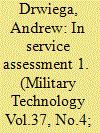

|
|
|
|
|
| Publication |
2013.
|
| Summary/Abstract |
While deliveries of the V-22 to the USMC and USAF continue, Bell and Boeing part company on generation-3 tiltrotor development.
|
|
|
|
|
|
|
|
|
|
|
|
|
|
|
|
| 4 |
ID:
131239
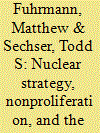

|
|
|
|
|
| Publication |
2014.
|
| Summary/Abstract |
Why do countries deploy nuclear weapons abroad? Since 1945, more than twenty states have hosted foreign nuclear weapons on their territory, and five countries continue to do so today. These deployments have important consequences for international security, yet there is little systematic research about the factors that drive them. In this article, we develop three broad theoretical frameworks to explain why foreign nuclear deployments occur. Using a new data set of foreign nuclear deployments between 1945 and 2000, we find that two factors weigh heavily in driving these deployments: the protection of allies and the projection of military power. Nonproliferation motives, however, appear to play little role. The results carry important implications for our understanding of the causes of proliferation and the sources of nuclear posture.
|
|
|
|
|
|
|
|
|
|
|
|
|
|
|
|
| 5 |
ID:
152713
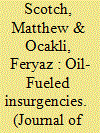

|
|
|
|
|
| Summary/Abstract |
What makes oil a lootable resource? We explore the conditions under which oil rents accrue to violent nonstate actors by disaggregating the oil supply chain. We argue that territorial control by states and insurgent groups shapes how oil is looted. It is more likely to be looted at the extraction and refinement phases in insurgent-controlled zones. In zones that are contested between the state and insurgents, oil is more likely to be looted at the transportation phase. Oil looting is rare in state-controlled zones, but never fully eradicated. Corporate and government corruption reduces risk for looters and enables the expansion of theft operations. We explore these arguments with a comparative analysis of the Islamic State in Iraq and Syria and the Movement for the Emancipation of the Niger Delta in Nigeria.
|
|
|
|
|
|
|
|
|
|
|
|
|
|
|
|
| 6 |
ID:
138987
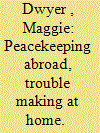

|
|
|
|
|
| Summary/Abstract |
This article draws attention to a trend in which military deployments as part of peacekeeping missions have triggered army mutinies in some West African countries. It explains how participation in peacekeeping missions created new material grievances and a sense of injustice amongst the peacekeepers, which under certain conditions sparked domestic mutinies. These uprisings in West Africa follow a history of military disobedience in the region, and the article places them in the context of long-standing tensions within military organizations. Mutinies often symbolize and intensify divisions within armed forces, which can lead to further instability even after the mutiny is resolved. Therefore, it is important for those interested in building and maintaining effective militaries to understand the ways in which deployments and peacekeeping participation can contribute to unrest within the armed forces. The article draws on interviews with former mutineers, including peacekeepers, and others military personnel in West Africa, as well as media reporting, including public statements made by mutineers, academic writing, and archival research.
|
|
|
|
|
|
|
|
|
|
|
|
|
|
|
|
|
|
|
|
|